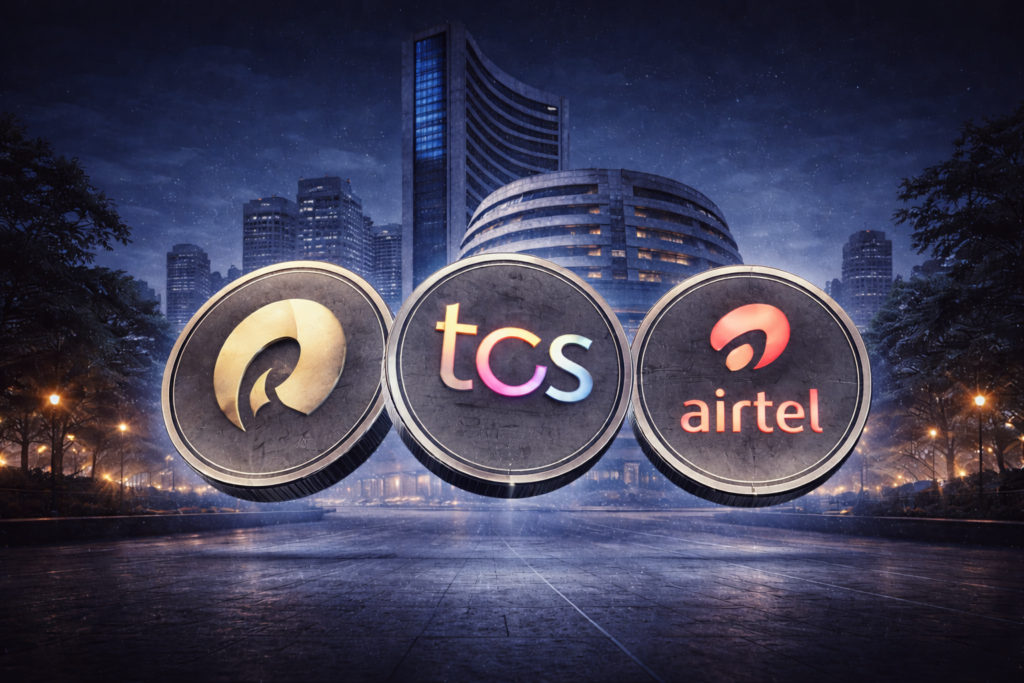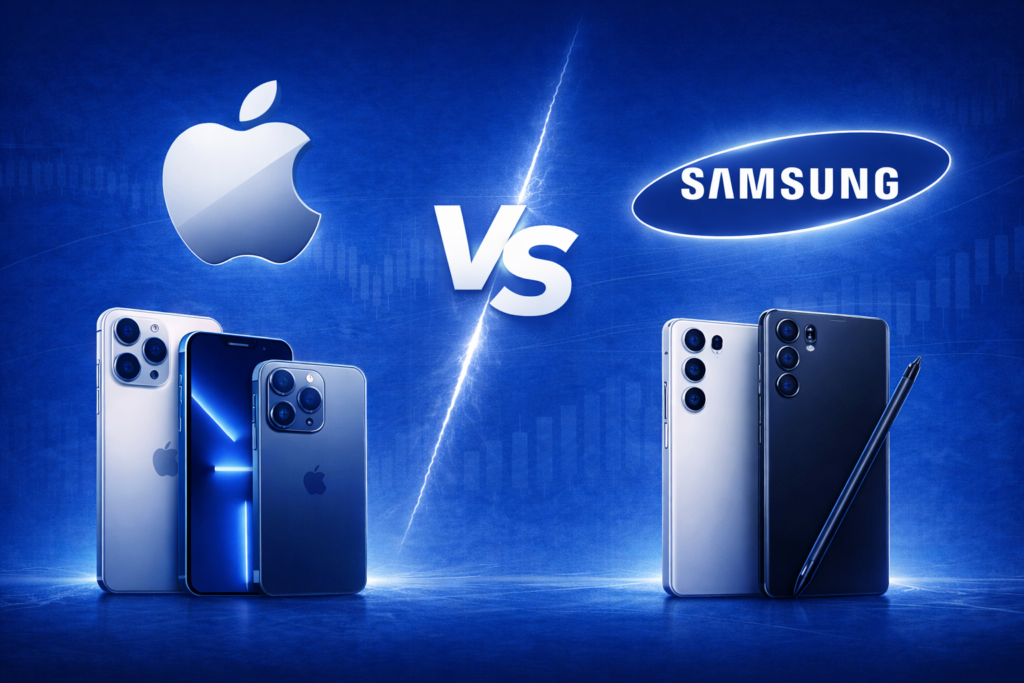The FMCG sector in India is one of the country’s largest and fastest-growing industries, led by the Best FMCG Companies such as Hindustan Unilever, ITC, and Nestlé India, which offer products across food, beverages, personal care, and household essentials. By 2026, the sector is expected to grow steadily due to rising urbanisation, increasing disposable incomes, and a strong shift toward branded, packaged, and health-focused FMCG products. The rapid expansion of e-commerce and quick-commerce platforms has improved accessibility across urban and rural markets, while growing emphasis on sustainability, eco-friendly packaging, and organic products continues to shape the future of the FMCG industry in India.
Quick Summary
Based on market leadership, brand strength, and growth outlook, here are the top FMCG companies in India to watch in 2026:
- HUL – Market leader with a broad product portfolio
- ITC – Diversified FMCG giant with strong rural reach
- Nestlé India – Packaged food leader with health-focused innovation
- Britannia – Trusted bakery brand expanding into wellness
- Varun Beverages – PepsiCo partner growing aggressively
- Tata Consumer – Expanding into organic and RTD markets
- Godrej Consumer, Marico, Colgate, P&G Hygiene – Strong personal and home care players
Why It Matters: Stable demand, growing middle class, and digital + e-commerce expansion make FMCG stocks a smart 2026 investment bet.
Want a quick visual overview? Check out our Web Story on the best FMCG Companies in India for bite-sized insights and highlights before you dive into the full analysis below.
Best FMCG Companies in India by Market Capitalization
The table below shows the list of the Top 10 FMCG Companies in India by Market Capitalization
| Stock Name (₹) | Market Cap (₹) | P/E Ratio | EPS (₹) | 52 Week High (₹) | 52 Week Low (₹) |
|---|---|---|---|---|---|
| ITC Limited | 3,964,245,131,527 | 11 | 28 | 444 | 302 |
| Hindustan Unilever Limited (HUL) | 5,542,215,365,526 | 51 | 46 | 2,750 | 2,136 |
| Varun Beverages | 1,511,643,207,500 | 50 | 9 | 569 | 420 |
| Nestle India | 2,503,530,160,355 | 77 | 17 | 1,340 | 1,055 |
| Britannia Industries | 1,453,760,021,100 | 60 | 100 | 6,336 | 4,506 |
| Godrej Consumer Products Limited (GCPL) | 1,221,651,036,581 | 67 | 18 | 1,309 | 980 |
| Tata Consumer Products Limited | 1,132,054,695,200 | 77 | 15 | 1,221 | 930 |
| Marico Limited | 989,862,162,211 | 58 | 13 | 780 | 578 |
| Colgate-Palmolive (India) Limited | 575,575,913,439 | 43 | 49 | 2,747 | 2,029 |
| Procter & Gamble Hygiene and Health Care Ltd. | 375,927,714,130 | 44 | 265 | 14,543 | 11,470 |
List of Top 10 FMCG Companies in India in 2026
India’s FMCG sector is experiencing robust growth, driven by increasing consumer demand and evolving lifestyles. These top 10 FMCG companies in India for 2026 represent strong investment opportunities, offering a mix of established brands and innovative product lines.
Here’s a table of the top 10 FMCG companies in India:
1. Hindustan Unilever Limited (HUL)
Hindustan Unilever Limited (HUL) is India’s leading fast-moving consumer goods (FMCG) company, established in 1933. With a diverse portfolio, HUL manages over 50 well-known brands across 16 FMCG categories, including food and beverages, personal care, home care, and water purification. The company’s long-standing presence in the Indian market has positioned it as a household name synonymous with quality and trust.
Financial Highlights:
- Revenue Growth: revenue of 162.41B INR in the quarter ending September 30, 2025, with 1.98% growth.
- Market Cap : Market cap has increased by 11.25% in one year.
- Annual Revenue of 631.21B with 1.98% growth.
2. ITC Limited
ITC Limited, established in 1910, has evolved from a tobacco company into a diversified conglomerate with a significant presence in various sectors. The company’s portfolio spans across Fast Moving Consumer Goods (FMCG), Hotels, Paperboards and Packaging, Agri-Business, and Information Technology. This transformation highlights ITC’s commitment to innovation and sustainability, positioning it as a key player in multiple industries.
Financial Highlights:
- Revenue Growth: revenue of 195.02B INR in the quarter ending September 30, 2025, a decrease of -5.95%.
- Market Cap : Market cap decreased by -26.53% in one year.
- Annual Revenue of 753.23B with 10.88% growth.
3. Nestle India
Nestle India, a subsidiary of the Swiss multinational giant Nestle S.A., has been a significant player in the Indian food and beverage industry since 1961. Known for its wide range of products including baby food, bottled water, breakfast cereals, coffee, confectionery, dairy products, ice cream, and pet foods, Nestle India has established itself as a household name across the country.
Financial Highlights:
- Revenue Growth: revenue of 56.44B INR in the quarter ending September 30, 2025, with 10.57% growth.
- Market Cap : Market cap has increased by 20.78% in one year.
- Annual Revenue of 201.49B with 3.28% growth.
4. Britannia Industries
Britannia Industries, established in 1918, is one of India’s leading food companies with a significant presence in the bakery and dairy segments. The company, headquartered in Kolkata, is well-known for its iconic brands such as Good Day, Tiger, NutriChoice, and Marie Gold. Britannia’s products are trusted by millions across India and several international markets.
Financial Highlights:
- Revenue Growth: revenue of 48.41B INR in the quarter ending September 30, 2025, with 3.71% growth.
- Market Cap : Market cap has increased by 28.42% in one year.
- Annual Revenue of 178.85B with 6.98% growth.
5. Varun Beverages
Varun Beverages Limited (VBL), a key player in the Indian FMCG sector, is the largest bottling partner for PepsiCo in India. Founded in 1995, VBL has grown to manage a significant portion of PepsiCo’s beverage business in the country, including manufacturing, bottling, and distributing a range of carbonated soft drinks and non-carbonated beverages. The company operates numerous state-of-the-art manufacturing plants across India, ensuring extensive reach and consistent product quality.
Financial Highlights:
- Revenue Growth: revenue of 48.97B INR in the quarter ending September 30, 2025, with 1.91% growth.
- Market Cap : Market cap has decreased by -18.21% in one year.
- Annual Revenue of 200.08B with 24.72% growth.
6. Godrej Consumer Products Limited
Godrej Consumer Products Limited (GCPL), established in 2001, specialises in home and personal care products. The company operates under the larger Godrej Group umbrella, known for its diverse product portfolio ranging from soaps to insecticides and hair care products. GCPL’s brands, including Cinthol, Godrej Expert, and Goodknight, are household names in India and several international markets.
Financial Highlights:
- Revenue Growth: revenue of 38.25B INR in the quarter ending September 30, 2025, with 4.33% growth.
- Market Cap : Market cap has increased by 16.26% in one year.
- Annual Revenue of 143.64B with 1.90% growth.
7. Marico Limited
Marico Limited, founded in 1988, is a prominent Indian consumer goods company with a diverse product portfolio. It operates in over 25 countries, providing a range of products in categories such as hair care, skin care, edible oils, male grooming, and health foods. Some of its well-known brands include Parachute, Saffola, and Set Wet.
Financial Highlights:
- Revenue Growth: revenue of 34.82B INR in the quarter ending September 30, 2025, with 30.71% growth.
- Market Cap : Market cap has increased by 21.11% in one year.
- Annual Revenue of 108.31B with 12.20% growth.
8. Colgate-Palmolive (India) Limited
Colgate-Palmolive (India) Limited, a subsidiary of the global Colgate-Palmolive Company, was established in 1937. Headquartered in Mumbai, the company has been a leading player in the Indian oral care market for decades, primarily known for its Colgate toothpaste brand. The company’s portfolio also includes personal care and household surface care products, making it a prominent name in the FMCG sector.
Financial Highlights:
- Revenue Growth: revenue of 15.20B INR in the quarter ending September 30, 2025, a decrease of -6.15%.
- Market Cap : Market cap has decreased by -25.64% in one year.
- Annual Revenue of 60.40B with 6.33% growth.
9. Procter & Gamble Hygiene and Health Care Limited
Procter & Gamble Hygiene and Health Care Limited (PGHHCL) is a subsidiary of Procter & Gamble Co., a global leader in consumer goods. Established in 1964, PGHHCL has made significant strides in the Indian market, focusing on providing high-quality health and hygiene products. The company is renowned for its innovative products and commitment to improving the lives of its consumers.
Financial Highlights:
- Revenue Growth: revenue of 11.50B INR in the quarter ending September 30, 2025, with 1.32% growth.
- Market Cap : Market cap has decreased by -16.76% in one year.
- Annual Revenue of 43.06B with 2.39% growth.
10. TATA Consumer Products Limited
Tata Consumer Products Limited, part of the Tata Group, is a prominent player in the FMCG sector, known for its extensive range of beverages, foods, and packaged goods. The company operates several well-known brands, including Tata Tea, Tetley, Tata Salt, and Tata Sampann, catering to diverse consumer needs globally. Their mission is to passionately grow and innovate every day, aiming to build better lives and thriving communities.
Financial Highlights:
- Revenue Growth: revenue of 49.66B INR in the quarter ending September 30, 2025, with 17.83% growth.
- Market Cap : Market cap has increased by 34.64% in one year.
- Annual Revenue of 176.18B with 15.87% growth.
What are FMCG ?
What sets FMCG products apart is their quick turnover – they’re bought frequently, used quickly, and replaced often. Think of the toothpaste you use daily, the snacks you buy weekly, or the laundry detergent you purchase monthly – these are all examples of FMCG products.
These companies operate in a highly competitive market where brand recognition and customer loyalty are crucial. They focus on high-volume sales with relatively low-profit margins per item.
Reasons to Invest in the FMCG Sector
1. Persistent and Growing Consumer Demand
India’s FMCG sector thrives on a consistent and growing demand for essential products. From household items to personal care, the sector addresses daily needs, ensuring a steady consumption pattern. The country’s rising population and urbanisation are key drivers of this demand, making the FMCG sector resilient to economic fluctuations and an indispensable part of everyday life.
2. Accelerating Urbanization Driving Market Growth
Urbanisation in India is rapidly increasing, bringing significant changes in consumer lifestyles and preferences. As more people migrate to cities, the demand for convenient, ready-to-use products rises. This urban shift boosts the FMCG sector, as city dwellers prefer branded and packaged goods for their quality and convenience. This trend is expected to persist, supporting the ongoing growth of FMCG companies.
3. Government Policies and Support Enhancing Sector Efficiency
The Indian government has implemented several policies to bolster the FMCG sector. Initiatives like the Goods and Services Tax (GST) have streamlined the supply chain, reducing costs and improving efficiency. Additionally, schemes such as ‘Make in India’ encourage local manufacturing, further strengthening the FMCG sector’s infrastructure and market reach, fostering an environment conducive to growth and development.
4. E-commerce Expansion Boosting Market Reach
The rapid growth of e-commerce platforms in India has significantly impacted the FMCG sector. Online shopping provides consumers with easy access to a wide range of FMCG products, boosting sales and market penetration. FMCG companies are leveraging digital channels to reach a broader audience, offering convenience and competitive pricing, thus driving substantial growth in this sector.
5. Continuous Innovation and Product Diversification
Indian FMCG companies are continuously innovating and diversifying their product offerings to meet evolving consumer preferences. From introducing health and wellness products to eco-friendly packaging, these innovations cater to the changing demands of consumers. Such strategic initiatives not only attract new customers but also enhance brand loyalty among existing ones, fostering long-term growth.
6. Global Market Expansion Enhancing Competitive Edge
Indian FMCG companies are increasingly expanding their presence in international markets. By tapping into global demand, these companies not only boost their revenue but also gain valuable insights and expertise. This international exposure helps Indian FMCG firms adopt best practices and innovate further, strengthening their competitive edge both domestically and globally.
Conclusion
The FMCG sector in India continues to show robust growth and resilience in 2026. Companies such as Varun Beverages and Colgate-Palmolive showed exceptional year-over-year growth in this sector.
Remember that you should never be carried away by the potential of a single sector. As an investor, the factor that is most in your control is the risk you take, and managing that risk over the long term is key to success. So spread your investments across two or three FMCG companies, as well as other sectors to mitigate your investment risk. Diversifying your portfolio can help reduce the impact of market volatility and company-specific risks.
Also Read: Why diversification is important
To get really savvy with your risk management and optimise your portfolio for growth at the same time, consider geographic diversification as well. For example, you can invest in US stocks through the Appreciate App, including US FMCG stocks. US stocks have (historically ) outperformed Indian stocks, and over the years, the Indian rupee has consistently lost value against the US dollar.
By investing in US stocks, you are now getting to be on the side that is benefiting from the rupee falling, not suffering from it.
FAQs on Top FMCG Companies in India
1. Which is the best FMCG Company in India?
According to the latest data, Hindustan Unilever Limited (HUL) is regarded as the best FMCG company in India, leading the market with its diverse range of products in sectors like personal care, food, and home care.
2. What is the future of FMCG in India?
The FMCG sector in India holds a promising future, driven by urbanisation, rising disposable incomes, and a growing emphasis on health and wellness. The sector is expected to grow further, with increasing demand for branded and eco-friendly products.
3. Is the FMCG sector stocks a good investment?
Yes, FMCG sector stocks are often seen as a safe and stable investment. Due to their consistent demand and resilience, FMCG companies generally perform well, even in economic downturns. However, investors should conduct thorough research before making any decisions.
4. What are the big brands of FMCG?
The leading FMCG brands include Hindustan Unilever, ITC, Nestle India, Britannia, and Godrej Consumer Products. These brands dominate various sectors like food, beverages, personal care, and household products.
5. What are FMCG brands?
FMCG brands, also known as consumer packaged goods (CPG) brands, represent products that are used frequently and replaced quickly. These brands focus on essential items like food, beverages, personal care, and household cleaning products.
6. What are the best stocks in the FMCG Industry?
The list of top 10 FMCG stocks in India:
- Hindustan Unilever Ltd
- ITC Ltd
- Nestle India Ltd
- Britannia Industries Ltd
- Varun Beverages Ltd
- Godrej Consumer Products Ltd
- Marico Ltd
- Colgate-Palmolive (India) Ltd
- Procter & Gamble Hygiene and Health Care Ltd
- Tata Consumer Products Ltd
Note: This information is for educational purposes only and should not be considered financial advice.
7. How can I invest in FMCG sector stocks?
You can invest in FMCG sector stocks via various platforms like Smallcase, which allows you to invest in FMCG portfolios while tracking their performance. It is important to consider long-term goals when investing in FMCG stocks.
8. Is it a good time to invest in FMCG stocks?
FMCG stocks are generally considered a stable investment due to their essential nature. If you plan to invest for 5-6 years or more, FMCG stocks can provide favourable returns. Always evaluate your financial goals and risk tolerance before investing.
9. Who should invest in FMCG sector stocks?
Investors seeking steady growth with lower risk may find FMCG stocks appealing. These stocks benefit from consistent consumer demand and strong brand loyalty. However, it’s important to assess individual risk profiles before investing.
10. Can FMCG stocks be profitable for investors?
Yes, FMCG stocks can be profitable, though they typically operate on thin profit margins. Investors should consider both the growth potential and the challenges in the FMCG sector to make informed investment choices.
11. How can I find the best stocks in the FMCG sector share list?
To identify the best FMCG stocks, you can research financial reports, track market performance, and follow industry news for insights into companies’ performance and future prospects.
12. What should I consider before buying FMCG stocks?
Before investing, consider the company’s financial performance, its brand strength, and market share. Look for companies that innovate and expand their product lines. Evaluate their focus on sustainability and how economic factors, like inflation, could impact consumer demand.
14. What are the challenges of investing in FMCG stocks in India?
Challenges include thin profit margins and intense competition within the sector. Regulatory changes and inflation can affect costs and pricing. Additionally, disruptions in the supply chain can lead to operational delays, impacting a company’s profitability.
15. What are the advantages of investing in FMCG stocks in India?
FMCG stocks offer stable demand due to essential products, resilience in economic downturns, and regular dividend payouts. Strong brand loyalty helps sustain revenue, while rising consumer spending in India presents growth opportunities for these companies.
Pro Tip: Once you’ve made the decision to invest in one or more of these FMCG shares, the next critical step is to keep a close watch on how they perform in the market and actively manage your portfolio. Make sure to have some solid reasons and logic behind your investment decisions. There will inevitably be a few days when the share prices of your chosen companies may go down. Your reasoning behind your investments will help you hold on during these turbulent times. If none of the underlying reasons behind your investments have changed, you can even buy more shares when their prices dip. Use our Share Price Average Calculator, to compute the average price of all your purchases, whether they were made at different times or prices. You can use this calculator before you buy more shares of a stock you already own, so that you have a better idea of the average price you will have paid for all shares of that stock.
Disclaimer
The information provided in this article is for educational and informational purposes only. It should not be considered as financial or investment advice. Investing in stocks involves risk, and it is important to conduct your own research and consult with a qualified financial advisor before making any investment decisions. The author and publisher are not responsible for any financial losses or gains that may result from the use of this information.























